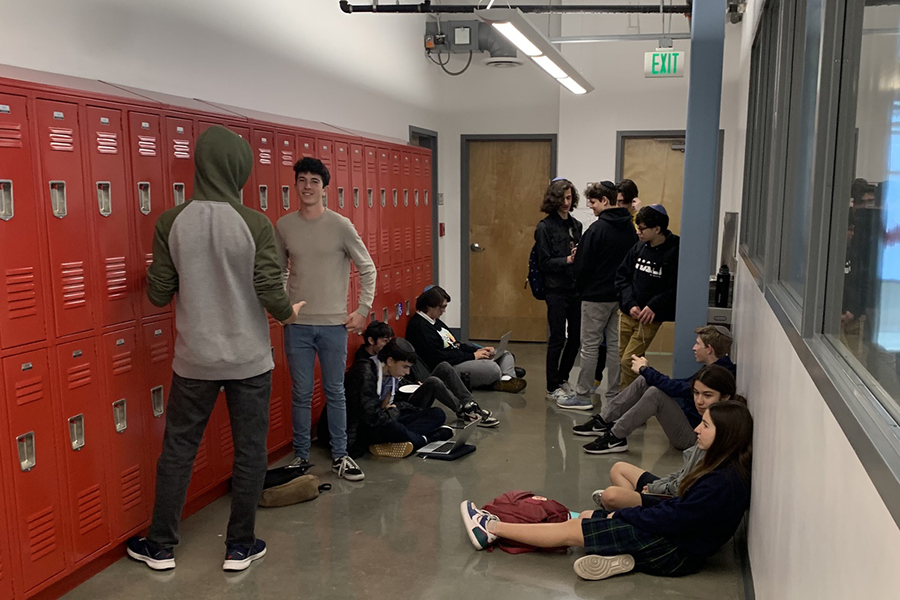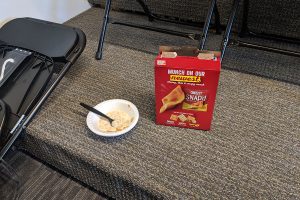Week of locked doors brings clean classrooms, loud hallways
Teachers say policy succeeded; Fairness says no further action planned
CROWDED: Students locked out of classrooms filled hallways during lunch Feb. 28. Complaints included no place to sit and difficulty concentrating and socializing due to a high noise level in the halls.
March 3, 2020
After a week of being asked to close doors during non-class periods, teachers pronounced the anti-vandalism policy instigated by the Fairness Committee a success this morning, saying there had been no food left in rooms and the plan had worked.
Students, meanwhile, had struggled to find space to work and socialize. During flex, swap and lunch periods, more than usual could be found in the hallways and on the roof, also greatly increasing the noise level in those areas.
The Fairness Committee had announced the week-long policy last Town Hall, after hearing a complaint against the student body filed by English teacher Ms. Michelle Crincoli, and also observing student behavior around the school.
First they set a two-week probationary period starting Jan. 27, in response to English teacher Ms. Michelle Crincoli bringing a complaint against the entire student body to the Fairness Committee, the committee announced a one-week period where doors would be closed starting last Tuesday at Town Hall.
Some classrooms were not locked by teachers and students ate in them, but overall classrooms remained clean when teachers entered them before class.
“It hasn’t gone off perfectly,” said Fairness faculty adviser Dr. Keith Harris. “But what I will say is that it has at least illustrated to the students that it’s an issue.”
He added that he didn’t think the problem — referring to cases of students leaving trash that were posted on Schoology by teachers– had resulted from students intentionally trying to destroy school property.
“I think really, honestly, 90% of the stuff that went down a few weeks ago, I think it’s just carelessness,” Dr. Harris said.
“The kids aren’t being malicious… and if anything, it’s just got them to think that about being more mindful about other people’s property, making messes and cleaning them up.”
During the first Town Hall since the locked-door initiative started, Fairness Co-Chair Evan Rubel the committee had no plans to extend the policy “unless another incident were to occur.”
“We’re going to continue to monitor the situation but we’re very optimistic that this was a positive change in our community,” Evan said this morning at Town Hall.
During the week when doors were locked, many students expressed discontent about the lack of space and loud hallways, while teachers were happy to have clean classrooms.
Some students who usually work in rooms during free periods found it difficult to find somewhere to work, as hallways have become more crowded with people.
“Sometimes I need a quiet space to work and now I don’t know where to go for quiet,” said ninth-grader Kayla Becker, who was working at a table on the second floor during lunch on Monday “Everyone is around the halls and I just don’t know where to go so I kind of feel trapped.”
“You can’t study in the hall any more since it’s really loud,” said junior Mimi Czucker.
Another issue for students was finding somewhere else to eat lunch.
According to a Boiling Point count Feb. 21, there are 189 chairs on campus that are located outside of classrooms: 43 in the cafeteria, 30 outside the parking lot, 69 on the third-floor patio, 22 in the second-floor lobby, 13 in the college counselling office and 8 in educational support office, and 4 in the basement space opposite the elevator.
There are 258 students in the school.
Before the policy, students ate in small groups in classrooms throughout the school during lunch. But during the week of locked doors, food could be seen on the turf, on desks in hallways and on desks outside the parking lot.
During the week of locked doors, junior Rena Harkham said she couldn’t find a seat anywhere.
“I have to sit on the turf, especially since we don’t have a cafeteria,” said Rena. “There’s nowhere for me to sit other than the floor, and it’s burning hot and then I get sweaty for the whole day and it’s just uncomfortable.”
Senior Tobey Lee said eating in the halls removed a social dimension.
“It’s super super inconvenient, especially for me who likes to sit in classrooms, talk, eat and be with friends,” said Tobey. “Especially if you want to have good conversations or if you want to watch a video or just hang out, it’s hard to do that in the halls when there are 20 or 30 people out there talking.”
Teachers were asked to lock doors when leaving their classrooms. But if they did not, students could still go in and eat lunch in those rooms. Students could also be in a room during non-class periods if a teacher was present.
Science teacher Mr. Chris St. Germaine, who teaches in rooms 207 and 210, said that before the policy, students usually left messes in his room — and also took or destroyed white board markers.
“Especially after lunch there would be literal food on desks, on the ground, on the chairs,” said Mr. St Germaine. “White board markers would either be gone or they would have been used to doodle with and then the caps were just left off of them… That was the big issue I had, so being gone really made a difference last week.”
Compliance wasn’t perfect, however. Math teacher Mr. Andrew Sinajon, who teaches in b102, said that sometimes he walked into his classroom after free periods to find it unlocked.
Many classrooms have classes taught by different teachers throughout the day.
“Overall it was an improvement but there could have been a better execution in terms of my room,” said Mr. Sinajon.
Dr. Harris said this was an issue that other teachers had brought.
“From what I understand, it’s been a little spotty with the doors being locked, but for the most part everybody is doing the best they can,” Dr. Harris said.
Some students believe that the week of locked doors would not curb the problem long-term. Senior Yishai Thau said that the school should have taken more drastic measures to ensure students cleaned up after themselves.
“It negates the actual issue, which is that kids aren’t cleaning up after themselves,” said Yishai.“Instead I believe names should be written on the hot lunch food items so there is accountability for who leaves food out.”
Mimi Czuker doubted the effect would last long-term.
“It’s a high school,” said Mimi Czuker. “People are going to do dumb things once in a while and this isn’t changing that.”
But Tobey Lee thought it would have a good effect.
“This will teach students that we need to stand up and say ‘if you want privileges and if you want to use classrooms, you need to step up and you need to clean up for yourselves,” said Tobey.
















